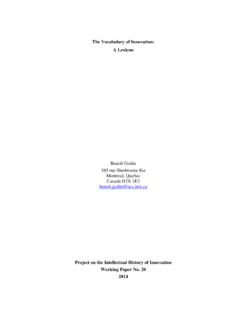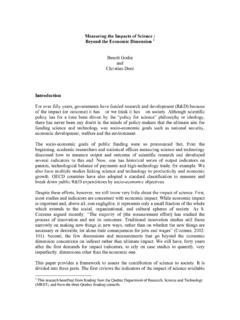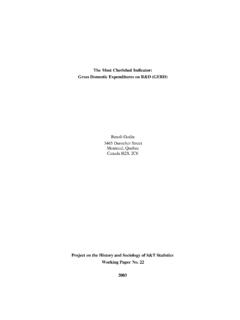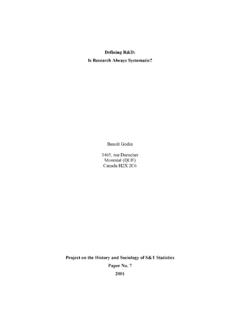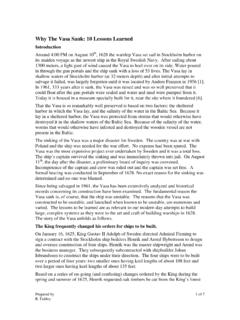Transcription of Innovation: the History of a Category - CSIIC
1 innovation : The History of a Category Beno t Godin 385 rue Sherbrooke Est Montr al, Qu bec Canada H2X 1E3 Project on the Intellectual History of innovation Working Paper No. 1 2008 Project on the Intellectual History of innovation 385 rue Sherbrooke Est, Montreal, Quebec H2X 1E3 Telephone: (514) 499-4074 Facsimile: (514) 499-4065 2 Abstract innovation is everywhere. In the world of goods (technology) certainly, but also in the realm of words.
2 innovation is discussed in scientific and technical literature, in social sciences such as sociology, management and economics, and in the humanities and arts. innovation is also a central idea in the popular imaginary, in the media and in public policy. How has innovation acquired such a central place in our society? This paper looks at innovation as Category , and suggests an outline for a genealogical History . It identifies the concepts that have defined innovation through History , from its very first meaning as novelty in the Middle Ages to the most recent interpretations in sociology and economics.
3 The paper suggests a genealogical History of innovation through the following three concepts: Imitation Invention innovation . 3 We have a violent Fondness for change, and greater Eagerness after Novelties , B. Mandeville, The Fable of the Bees, 1732. 4 Introduction innovation is everywhere. In the world of goods (technology) certainly, but also in the realm of words: innovation is discussed in the scientific and technical literature, in social sciences like History , sociology, management and economics, and in the humanities and arts.
4 innovation is also a central idea in the popular imaginary, in the media, in public policy and is part of everybody s vocabulary. Briefly stated, innovation has become the emblem of the modern society, a panacea for resolving many problems, and a phenomenon to be studied. As H. Nowotny defines our epoch: it is a fascination and quest for innovation (Nowotny, 2008; 2006). The quest for innovation is so strong that some go so far as to suggest that drugs like Ritalin and Adderall, used to treat psychiatric and neurological conditions, should be prescribed to the healthy as a cognitive enhancement technology for improving the innovative abilities of our species (Greely et al.)
5 , 2008). This suggests three questions. First, why has innovation acquired such a central place in our society or, put differently, where precisely does the idea of innovation come from? To many, innovation is a relatively recent phenomenon and its study more recent yet: innovation has acquired real importance in the twentieth century. In point of fact, however, innovation has always existed. The concept itself emerged centuries ago. This suggests a second question: why did innovation come to be defined as technological innovation ?
6 Many people spontaneously understand innovation to be technological innovation . The literature itself takes this for granted. More often than not, studies on technological innovation simply use the term innovation , although they are really concerned with technological innovation . However, etymologically and historically, the concept of innovation is much broader. How, when and by whom did its meaning come to be restricted to technology? Third, why is innovation generally understood, in many milieus, as commercialized innovation ?
7 It is hard today to imagine technology without thinking of the market. One frequently hears 5 of innovations that are marketed by firms, but other types of innovation are either rapidly forgotten or rarely discussed. By contrast, every individual is to a certain extent innovative; artists are innovative, scientists are innovative, and so are organizations in their day-to-day operations. To answer these three questions, this paper looks at innovation as a Category and at its historical development. The paper is not a History of innovation itself (or innovations), neither a contextual History .
8 It looks rather at the representations of innovation and the discourses held in the name of innovation , namely since the term first appeared in the Middle Ages: how the public, innovators themselves, and academics, and particularly the theories of the latter, have understood innovation and talked about it. This paper offers very preliminary ideas toward a genealogical History of the Category innovation . It identifies the concepts that have defined innovation through History , and that have led to innovation as a central Category of modern society.
9 It concentrates on the creative dimension of innovation . This dimension got into innovation in the twentieth century. At the very beginning, innovation was rather concerned with change, broadly understood, and had nothing to do with creativity. innovation as change will be dealt with in another paper (Godin, 2009b). The paper is programmatic in the sense that it suggests a program of research or outline for such a genealogical History , a History that remains to be written. In the Archeology of Scientific Reason, M.
10 Foucault asked Comment se fait-il que tel concept soit apparu et nul autre sa place? , (Foucault, 1969: 39-40) that is, under what conditions does a word come to mean what it signifies for us today? To Foucault, a genealogy is a study of descent rather than origins: the details and accidents, the forces and struggles that accompany every conceptual beginning and its further solidification (Foucault, 1984). 6 7 In a recently-launched project on the intellectual History of innovation , of which this paper is the first in a series, a genealogical study is framed through concepts, their uses and their context.

